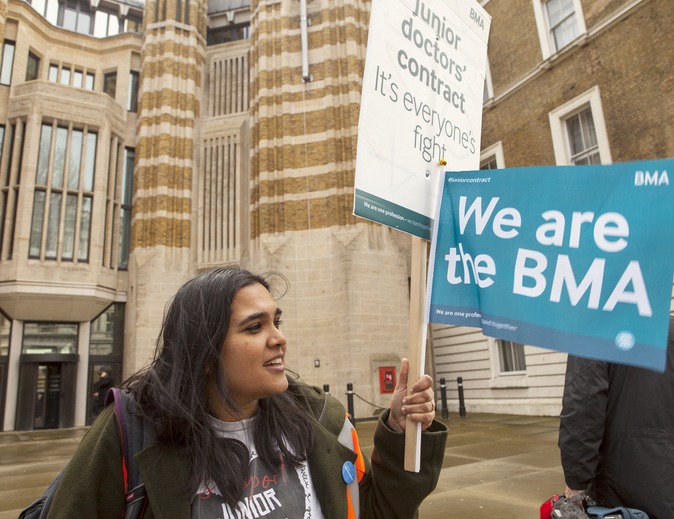
As reported by the BBC, doctors’ leaders and ministers are being urged to start formal pay talks after a breakthrough on a deal with other NHS staff in England
Unions for NHS staff, including nurses and ambulance workers, recommended on Thursday their members back a fresh offer of a five per cent pay rise from April.
But the British Medical Association (BMA) and government are not yet in talks to resolve the doctors’ dispute.
Junior doctors in England took part in a three-day walkout earlier this week.
The strike, which affected planned and emergency care, caused major disruption, NHS bosses said.
Thursday’s fresh pay offer to NHS staff, including nurses, ambulance workers and physiotherapists, has the backing of most unions, and has brought hope the strikes that have blighted the NHS over the winter are a thing of the past.
This offer, which is not yet a done deal, includes a one-off payment of at least £1,655 to recognise working through the pandemic.
The 14 unions involved will now put it to their members to vote on, with the biggest three – the Royal College of Nursing, Unison and the GMB – all backing the deal.
But the Unite union has said it cannot recommend the offer but will put it to a vote and support the decision they make.
The junior doctors’ pay dispute is far from resolved with the BMA calling for a 35% pay rise, which it argues will reverse 15 years of cuts.
But the breakthrough in the separate NHS staff dispute has raised hopes that the stand-off between the government and junior doctors could be resolved.
Dr Vivek Trivedi, co-chair of the junior doctors committee at the BMA, said the organisation was in touch with the health secretary and negotiators could meet “in the near future”.
The government made a last-minute offer of formal pay talks last Friday – three days before the walkout, however, the BMA rejected it, saying the pre-conditions were not acceptable.
The government was only prepared to discuss pay for junior doctors for the next financial year along with the option of a one-off payment for the past year in return for calling off the strike action.
This was the same offer made to the unions acting on behalf of other NHS staff, according to sources.
Following Thursday’s breakthrough, Health Secretary Steve Barclay called for the junior doctors to call off industrial action and enter into talks, saying the request for a 35% pay rise was “not affordable”.
“We have offered the same terms to the junior doctors that were accepted by the other trade unions and that is what I hope the junior doctors will respond to,” he said.
Thursday’s pay offer now puts the onus on both sides in the doctors’ dispute to show willingness to get round the table.
Letters have been exchanged in the past 24 hours between Mr Barclay and the BMA but as yet no agreement has been reached on starting talks.
Privately many observers are saying the biggest pressure is on the doctors. If other frontline NHS staff who are overall lower paid than junior doctors are willing to accept a five per cent rise and a one-off payment of between £1,600 to £2,500 why should doctors hold out for 35% more, they are asking.
Matthew Taylor, of the NHS Confederation, said: “Health leaders will be urging junior doctors and the government to use this deal as a way of entering talks to address that dispute.”
And Sir Julian Hartley, the head of NHS Providers, added there must be “urgent movement on talks” and said both sides needed to “redouble” the efforts.
Louise Ansari, head of the patient watchdog Healthwatch England, said: “We now urge a swift resolution of pay disputes between doctors and government to avoid any further delays to patient care.”
The question over how any pay deal will be paid for remains. Ministers said they could guarantee there would be no impact on frontline services as the result of Thursday’s pay offer to NHS staff.
Mr Barclay said there would be discussions with the Treasury over how it would be funded and the Department of Health would look at areas of underspend and administrative savings to help fund the pay deal.
Prime Minister Rishi Sunak called the pay deal “affordable for the taxpayer”, saying it continued to deliver on his promise to halve inflation.
Strike action has also been paused in Wales and Scotland by most unions while new offers are considered. The GMB in Scotland has accepted the Scottish offer, worth 14% over two years.


Be the first to comment